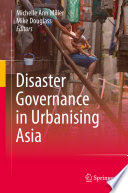
Chintraruck, Alin and John Walsh, “Bangkok and the Floods of 2011: Urban Governance and the Struggle for Democratization,” in Michelle Ann Miller and Michael Douglass, eds., Disaster Governance in Asia (Springer, 2016), pp.195-209, available at: https://books.google.co.th/books?hl=en&lr=lang_en&id=gLcvCwAAQBAJ&oi=fnd&pg=PA194&dq=Walsh++%22Shinawatra+University%22&ots=ZgJUFSj-Tx&sig=9yt7sTvQhPc6scYRNE5eR2jMqrU&redir_esc=y.
Abstract:
The 2011 floods in Thailand took more than 700 lives and was one of the world’s three most severe economic disasters of that year. The incoming Pheu Thai administration, under PM Yingluck Shinawatra, faced its first significant emergency and was hamstrung by the limited ability of government to act. There was little coordination between government efforts and those of the opposition-controlled Bangkok Metropolitan Administration and the army, which has long taken a role in disaster relief. Contentiously, provincial and peripheral areas were sacrificed to preserve central districts of Bangkok. Popular blame has fallen on the technocrat managers of the Royal Irrigation Department (RID), which manages the dams, as well as other unaccountable agencies and institutions. This has lent popular support to Pheu Thai’s strategy of broadening and deepening the scope of the democratically-elected government vis-à-vis unaccountable and unelected agencies. Decentralisation of water policy projects is part of the plan to increase the numbers of legitimate political actors and the Committee for Water and Flood Management will advise the RID and require any decisions made to be transparent and accountable. Plans to introduce a Ministry of Water will see the disaster mitigation infrastructure overseen by government agencies. The city of Bangkok will be at the heart of this struggle, since many of the large infrastructure projects will be located there and, as a primate city, it would be unthinkable for many elements of society for it to be subject to what is considered to be outside control.








